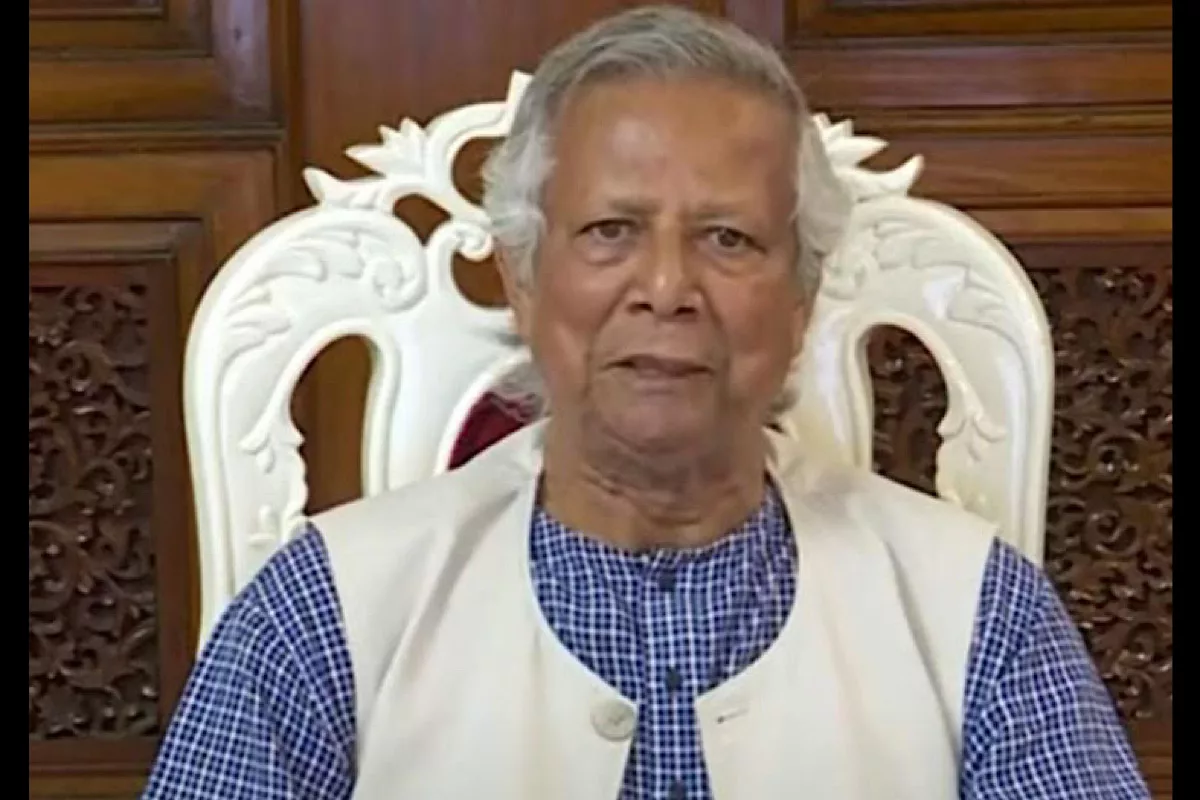Holding onto Chair: The many tactics of Bangladesh’s Muhammad Yunus
Muhammad Yunus's popularity is waning as the interim government faces a series of crisis, with Bangladesh's political landscape becoming increasingly complex.
Adecade has happened in the last couple of weeks: a discredited quota system has been removed, hundreds of lives have been lost and Sheikh Hasina, notorious for her dictatorial traits, resigned and fled Bangladesh.
SOUMALYA CHATTERJEE | New Delhi | August 12, 2024 8:42 am

Adecade has happened in the last couple of weeks: a discredited quota system has been removed, hundreds of lives have been lost and Sheikh Hasina, notorious for her dictatorial traits, resigned and fled Bangladesh. This week shall shape the future of Bangladesh at least for the decade to come. Students have backed the veteran economist and Bangladeshi Nobel laureate Dr. Muhammad Yunus, as the chief advisor of the interim government a praiseworthy stance for it means they did not get enticed by the Islamic fundamentalist forces and the BNP.
Amid this chaos, writer and activist Tariq Ali congratulated the students of Bangladesh for their amazing triumph and addressing them as ‘comrades and friends’, advised: “Do not trust the so-called opposition parties. They are no different. Rely on your own strength … This is a historic victory. Do not let anyone steal it from you.” There is no reason to hold a contradictory view. But the Indian response to the Bangladeshi students’ victory is a bit puzzling. There are reasons for this anxious response. India’s relationships with neighboring countries such as Pakistan and China are tense and unlikely to improve soon. In this situation, Bangladesh was one neighbor with whom New Delhi had been on good terms. Hasina’s exile is bound to make the Indian government anxious.
Advertisement
These geopolitical tensions are justified to some extent. But the popular Indian response to Bangladesh does not align with this line. It has to do with something else. What happened here is that the moment Hasina fled Bangladesh, thousands of posts flooded the feeds of Facebook, Instagram and X. The world was watching everything: from the students’ march on the streets, celebrations of their victory, occupation of Hasina’s house, vandalizing Sheikh Mujibur Rahman’s statue, and setting the Bangabandhu Memorial Museum on fire. We live in a time where images speak louder than anything else. Images always had this power to leave an imprint of that you would remember till your last breath. And today, circulation of an image happens in the blink of an eye. A chunk of posts started, stating that the minorities in Bangladesh are under attack.
Advertisement
It took no time to trend #AllEyesOnBangladeshiHindus on X. Half of the empathy turned into hatred in a few minutes. It was images – posters, caricatures, photographs – that implanted a seed of empathy among us and it is the image again that has led a few of us to equate the Bangladeshi minorities’ condition with the worst sort of ethnic cleansing. Impatience among netizens is nothing new. During the adrenaline rush they fail to ponder over facts and react. It is true that properties have been vandalized, minorities have been attacked but do we have enough evidence to declare this a genocide? Social media and the mainstream Indian media are also responsible for spreading a lot of misleading propaganda to vitiate the political and social environment in India. As a result the democratic voices, sharing their rational views, have been cornered.
The propagandists have spread images, showed videos without verifying, keeping the commoners from seeing the other side of the story. I’ve seen hundreds of posts where Muslims were seen guarding Hindu temples and the mosques were announcing that Hindu brothers should be protected. Amid the darkness, there indeed was light. We need to understand that Bangladesh is in a phase of transition. Anything can happen. In such a situation we must stand in solidarity with our neighbour and share our views rationally to guide them. We do not want the movement, which has earned victory at the cost of hundreds of lives, to be hijacked by Jamaat-e-Islami or BNP or by any other fundamentalist-opportunist force. We want secularism to prevail over Bangladesh. Lastly, I must say that the Indian response to anything cannot be a generalized statement. The nature of our country does not allow this. We unite in diversity. Our response to Bangladesh also carries manifold voices but we must work to stitch them in empathy.
(The writer is an alumnus of the department of Comparative Literature, Jadavpur University.)
Advertisement
Muhammad Yunus's popularity is waning as the interim government faces a series of crisis, with Bangladesh's political landscape becoming increasingly complex.
Former Bangladesh Prime Minister Sheikh Hasina has been formally charged with crimes against humanity by the country's International Crimes Tribunal (ICT) over her alleged role in the violent nationwide uprising of July 2024, according to local media reports.
Hakeem Baloch, a representative of the Baloch National Movement's Foreign Committee, described the situation in Balochistan as a "slow genocide" perpetrated by the Pakistani military and governmental bodies
Advertisement
